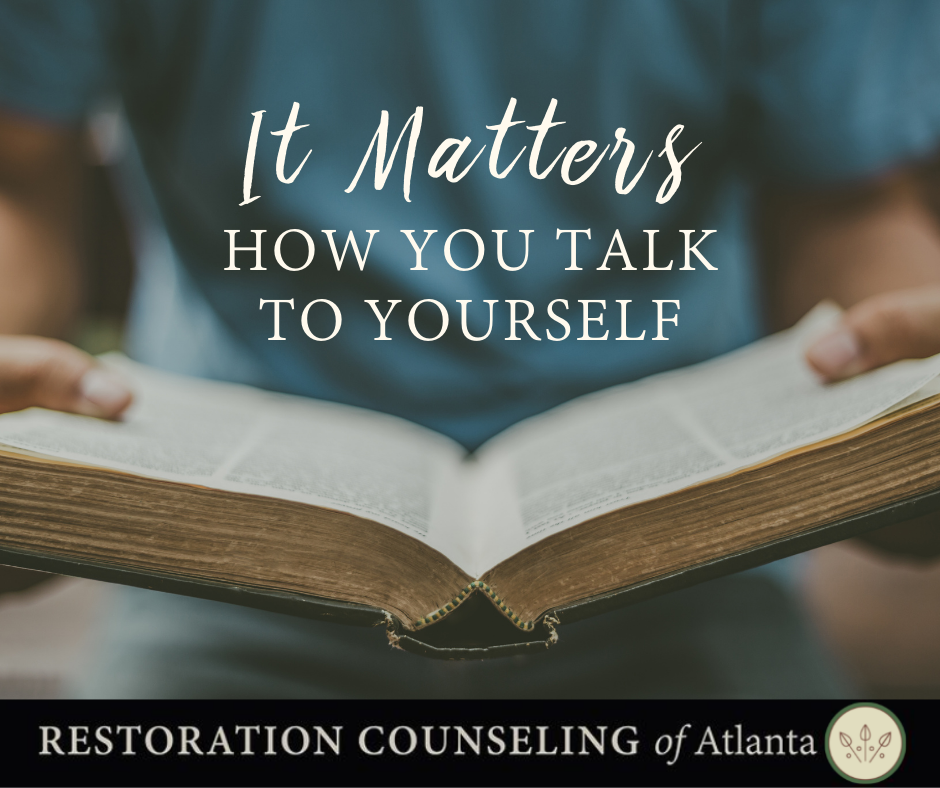Let’s Talk About Our Self-Talk
Have you ever noticed that the way we talk to ourselves can be drastically different than how we would talk to our loved ones? We are often missing self-compassion. It can be easy or even natural to see the good in others and vocalize it, but sometimes it’s easy to see our own shortcomings rather than the good. How would our confidence improve if we spoke more kind and lovingly to ourselves? Dr. Kristin Neff, a pioneer in the study of self-compassion, states, “With self-compassion, we give ourselves the same kindness and care we’d give to a good friend.”
What We Think Matters
My 8-year-old son, an avid baseball player, is making the transition from coach pitch to kid pitch. After his first practice of kid pitch, he came home and was extremely hard on himself. He failed to remember that he threw 9 awesome strikes to his coach in his first pitching practice. All he could focus on was after those 9 strikes, how he lost his momentum and started throwing wild pitches to his teammate.
My son’s inner dialogue was full of criticism and negative comments. Why is our innate self-talk often so harsh? Most of us would be embarrassed if we ever talked to our friends the way we talk to ourselves. My son wasn’t aware at the moment but what he needed was to interrupt his shame with compassion. Brene Brown reminds us, “Talk to yourself like you would talk to someone you love.”
What You Say Matters
While talking with him at bedtime, I encouraged him to see how he could shift his thinking from a fixed mindset to a growth mindset about the new challenges he was facing. I reminded him that his favorite professional baseball players don’t throw a strike every pitch or never have errors. I asked him what it would look like if he gently reminded himself that he’s trying something new, and it will take practice and time to improve his pitching. That one question helped him to start focusing on progress over perfection.
“You may try to change in ways that allow you to be more healthy and happy, but this is done because you care about yourself, not because you are worthless or unacceptable as you are. Perhaps most importantly, having compassion for yourself means that you honor and accept your humanness.” – Dr. Kristin Neff
Truth and Affirmations
Even in moments when we are struggling to see ourselves with love and compassion, as Christians, we can rely on God’s Truth to realign our view of ourselves. God has provided us with the best book of wisdom, the Bible, to affirm us when we need it most. I believe in the power of using affirmations from Scripture and “I” statements to shift our focus, and practice self-compassion. In addition to gratitude journaling, you can start with writing 1-3 affirmations daily. Here are a few examples to encourage you:
- I can do all things through Christ who strengthens me. – Philippians 4:13
- I am a strong child of God who is going through many hardships.
- Therefore, as God’s chosen people, holy and dearly loved, clothe yourselves with compassion, kindness, humility, gentleness, and patience. – Colossians 3:12
- So do not fear, for I am with you; do not be dismayed, for I am your God. I will strengthen you and help you; I will uphold you with my righteous right hand. – Isaiah 41:10
Next time you find yourself being extra harsh or critical of yourself, try journaling with these prompts. These reflection questions are from Give Yourself a Break by Kim Fredrickson.
- What would it look like if I spoke more gently to myself right now?
- Rather than telling myself “I can’t do this,” I can say- “I am learning how to do this.”
- What is your response to the whole idea of having compassion for yourself?
- What is it like to ponder that God looks at us with compassion and also wants us to approach ourselves with both compassion and truth?
- What would it be like to go through life with a compassionate friend on the inside rather than a judging bully? In what ways would this make the biggest difference in your life?
One of my favorite all-time quotes is this: 
Additional Resources
- Give Yourself a Break: Turning Your Inner Critic into a Compassionate Friend by Kim Fredrick
- https://www.aundikolber.com – Aundi Kolber- Author & Therapist

Written by Heidi Sawyer, MS, LPC
Roswell Location
heidi@restorationcounselingatl.com, 678.534.3824, ext 116
Heidi works with adolescents and adults with life planning issues, anxiety, depression, relationship challenges, spiritual issues, grief, life transitions, goal setting, and self-confidence. She focuses on helping her clients gain insight to their thought patterns, behaviors, and feelings using the lens of Cognitive Behavioral Theory combined with psychoeducation. Heidi also provides premarital counseling using the Prepare/Enrich program.

